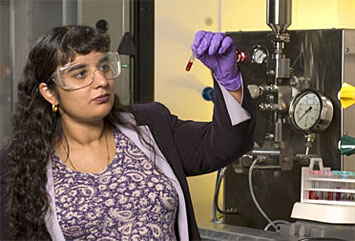Strengthening Your Networks and Responding to Stress and Strain: What Women in STEM Can Learn from Polymeric Hydrogels
April 21, 2017

Surita Bhatia
Surita R. Bhatia, a professor and vice chair for facilities and research in the Department of Chemistry at Stony Brook University, will give a talk, “Strengthening your Networks and Responding to Stress and Strain: What Women in STEM Can Learn from Polymeric Hydrogels,” at the U.S. Department of Energy's (DOE) Brookhaven National Laboratory on Tuesday, April 25, at 4:30 p.m. in the Hamilton Seminar Room. Sponsored by Brookhaven Science Associates, the event is free and open to the public. All visitors to the Laboratory 16 and older must bring a photo I.D.
Bhatia will speak about her research, which focuses on the use of polymeric hydrogels, materials that form a matrix allowing cells a place to anchor and multiply. The ability to create these hydrogels and synthetic materials that mimic the structural and mechanical properties of native tissues, like skin and fibrous tissue, is crucial for many biomaterials applications, including treatments for burn victims. Unfortunately, the design of such materials remains a significant challenge. Many native tissues and synthetic soft biomaterials are comprised of polymer networks, and scientists must determine the minimum properties that must be built into a synthetic polymer network in order to reproduce the properties of native tissues. Bhatia will discuss this challenge, while drawing parallels between lessons learned from designing soft materials and challenges faced by women in science, technology, engineering, and math (STEM) fields.
Bhatia was previously a visiting scientist at Brookhaven Lab’s Center for Functional Nanomaterials (CFN), a DOE Office of Science User Facility, where she conducted research in materials synthesis and characterization. Her research at the CFN focused on applications of complex fluids and soft materials ranging from the everyday products, such as shampoos, cosmetics, lotions, paints, and foods, to high-technology products for biomedical and energy applications, such as pharmaceutical formulations, wound dressings, advanced coatings, biofuels, and flow batteries.
Before coming to Stony Brook, Bhatia was a professor of chemical engineering and associate director of the Institute for Cellular Engineering at the University of Massachusetts-Amherst (UMASS-Amherst). While there, Bhatia and Professor Jeanne Hardy (also of UMass-Amherst) started a professional support group inspired by Ellen Daniell’s book, Every other Thursday: Stories and Strategies from Successful Women Scientists. The book tells the story of a professional problem-solving group that has empowered its members by providing practical and emotional support.
Surita R. Bhatia received her B.Ch.E. in chemical engineering from the University of Delaware, her Ph.D. in Chemical Engineering from Princeton University, and her postdoctoral training from the CNRS/Rhodia Complex Fluids research laboratory. She is a recipient of the National Science Foundation CAREER Award, a Dupont Young Professor Award, and a 3M Non-tenured Faculty Award. She received an AIChE Women’s Initiatives Committee Mentorship Excellence Award and was an invited participant in the 2009 National Academy of Engineering Frontiers of Engineering Education Symposium and a recent NSF/AAAS Workshop on Diversity in Nanoscience Fields.
2017-12191 | INT/EXT | Newsroom









